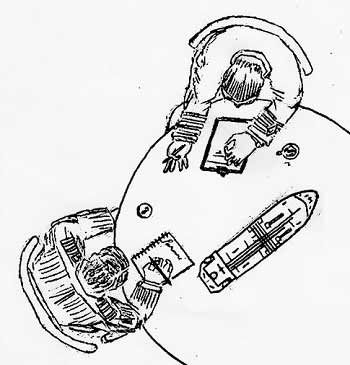
Let's face it- no one likes performance appraisals. Either doing them, or being appraised. Balancing criticism and praise, and managing feedback- it's emotionally draining. We fear conflict during appraisals, and of the appraisal possibly stalling or slowing down our careers.
But it doesn't have to be this way. People are the biggest resource in any business and performance appraisals are necessary - not just to understand employee performance but to develop their potential.
Unfortunately, very few of us have had any formal training in carrying out performance appraisals. Nor are many of the generic forms any good. Nor is there a clear understanding on why we need them.
Performance appraisals should be performance and career enablers. They are also need to be objective when tracking performance. However, this is not what I've always come across:
One of my roles in the past was of Crewing and Training Manager, leading a team for over 180 ships and a crew of over 8000. I reviewed dozens of crew-performance reports every week. A remark by a Master for a Chief Officer’s report had me confused. The Master said “he is like a bull in a China shop”. What did it mean?
The funny dictionary of performance evaluations terms:
- Average: What it really means, he is not too bright.
- Exceptional: Has committed no major blunders to date.
- Quick Thinking: Offers plausible excuses for errors.
- Has an Attitude: Knows more than superiors.
- Tactful: Knows when to keep mouth shut.
- Good management skills: Finds someone else to do the job.
- Conscientious and careful: Scared.
- Has Leadership Qualities: Has a loud voice.
- Gets along well with everyone: A coward.
- Hard Worker: Usually does it the hard way.
- Uses time effectively: Clock watcher.
- Deserves promotion: Has lost interest in his current position!
Humour aside, do we really know what these terms mean? Will the other person sitting across the table accept your judgement on his performance? Will he accept being called a “bull in a China shop”? How can the appraisals be a mirror to our work if the reflection is a bull? That’s bull.
One of the key virtues of a manager, including that of a senior ship’s officer is that he helps develop his people. The appraisal report is one of the most effective tools that they can use.
Avoid
How not to do it is simply telling a person that he is ‘average’. We are all emotional people, and the moment we see labels or numbers against our name, our anger clouds our brains, blocking out any useful input. Besides, just writing ‘average’, does not help to improve a seafarer who feels that he is already doing his best. In fact, 'average' is a poor descriptor of performance as it means the person is being compared with others rather than the standard required for the job.
Using accusing language and sarcasm are strict no-nos. In today’s world of commercial shipping, confidential reports do not help develop seafarers. You'll be surprised how most seafarers prefer to be told informed directly about their appraisal. Reports are usually kept confidential only in cases where gross-negligence, serious breach of company policy, or dismissal may be required.
Don't let differences in personalities interfere with the process. There may be people who question more, look and do things differently than you but that should not get in the way of an objective appraisals.
Preparing the appraisal
The best way to do an appraisal is that it should be done continuously. The crew member should constantly and instantly receive feedback about his performance, so it does not come as a shock when the paperwork is prepared.
I always recommend the supervisor to note in his diary about tasks in which the seafarer has performed well, or made errors, with dates. Unless this is done, we cannot support our appraisal with facts, or truly represent his performance over the last few months. If this is not done, we tend to remember performances only over the last few days, rather than that of his entire contract period.
One of the things when I revised the appraisal system in our company was to include a 'self-appraisal' field. The crew member would be given few days to complete the self-appraisal and then discuss it during the appraisal meeting. The appraisal forms were specific for the ranks and contained fields to record target achievement objectively over the appraisal period. The new forms did take longer to complete and there were several who complained of the long time it took to complete the appraisal process. But support for it was overwhelming, especially from the junior staff who felt that they had a voice in the process and it helped improve their career development. When human resources are our most valuable resource, it's worth that extra time to support their development. At the end of the day, every one has a boss- and it's fair to expect that one will be evaluated fairly and constructively.
Another important field of the appraisal report is probably the remarks column. A rule of the thumb is to write two positives for every negative comment you make- it shows that your report is balanced and also has a better chance that the other person will accept your report. For example, ‘His overhaul of the purifier was perfect (Feb 2019)’, ‘He assisted during the main engine overhauls (Mar 2019)’, ‘His passage-plan Singapore to Colombo did not contain Under-Keel Calculations’ at two locations (Mar 2019). He was briefed & he agreed to be careful’, ‘During the PSC inspection SCBA bottle was found with low charge (Apr 2019/). He was trained & he has improved since’ Writing such facts makes it hard to argue against and supports your grading system.
When recommending your juniors for promotion, take efforts to mentor them into the next position- I still remember with respect all my superiors who helped me learn and grow at different stages of my career. Don’t recommend if you observe they are not ready, and especially if you wouldn’t promote them on your ship!
Discussing the appraisal
Make the environment comfortable and the atmosphere friendly. Sit next to the person being appraised instead of opposite him; the corner of a table is ideal. Sometimes tempers could arise during an appraisal, and a comfortable setting calms people down.
Don’t be judgmental but share your opinions and facts. Start with the positives, and then discuss the areas for improvement.

Use the feedback sandwich: Phrases ideally used in this pattern are:
“Remember the time you did the purifier overhaul; I was impressed by how you did it exactly as per the manual” Then address the areas of improvement “What you could do even better is ensuring you check the SCBA bottles thoroughly; you do remember the PSC deficiency, don’t you? Such an issue could cause a serious problem during an actual emergency”
Give a positive overall comment.
State that ‘no one is perfect’, and your intention is for the appraisal to help him identify and improve upon his area for improvement.
Ask the seafarer how he would address the areas for improvement. Ask the person to repeat: “Could you explain to me how you intend to ensure you have all the bottles are tested for the right pressure?”
The subordinate’s role in the appraisal
“Feedback is the breakfast of champions” Ken Blanchard
There is part of our knowledge that can come only from others. I wrote in my book Golden Stripes- Leadership on the High Seas, that if you want to be a champion, an ideal seafarer- you have to be open to feedback. The subordinate should take notes when sitting for an appraisal, and ask questions. If it is not clear, ask “can you give me an example where you feel I should have paid more attention to cargo-stowage?” This way, you learn about potential pitfalls which you can avoid in the future.
Even better, the person being appraised should ask for appraisals. Ask “what do you think I am doing well?”, and “where do you feel I should focus more?” Preparing appraisals is stressful, and when you ask for your own appraisal, it puts the other person at ease and you might get some brilliant constructive feedback. You need a good mirror to see yourself; a good appraisal can give you a good idea about your performance. A good performance appraisal process goes beyond being a mirror- it's also a window to the future- a future that you would both like to see.
It takes more than one person to make a system work. Appraisals done properly foster an element of mutual trust and professionalism in the long run. We tried these simple steps with amazing success in our organization, and as a result, performance-related issues shrunk by 45%. When you have high performing individuals, you have high-performing teams!
By the way, I called up the Master who was on vacation and asked him the meaning of the comment- he said “yeah, he is too hyperactive, he is very rough-edged, he has to be softer with the crew”. I requested him to clarify “Did his behaviour create any problem on board?” He replied “no, no- this is just a general feeling I got about him”. And then I discussed with him what I have just written above.
--x--
References:
Donald L. Kirkpatrick, Improving Employee Performance through Appraisal and Coaching
Golden Stripes- Leadership on the High Seas


